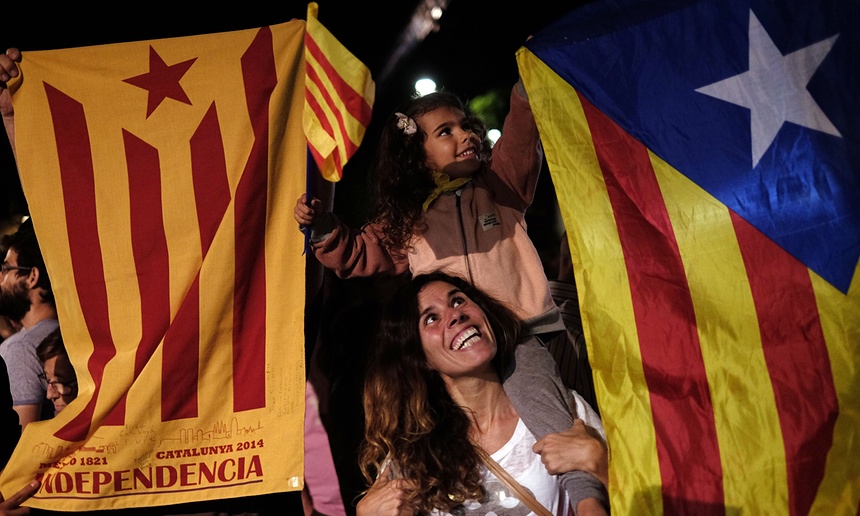05.10.2015 - 21:39
On 27 September Catalonia’s voters went to the polls and with a record 77.4% turnout gave a win in every single electoral district to the political forces whose campaign promise was, if elected, that they would follow a “roadmap” towards Catalan independence from Spain. Pro-independence lists obtained 48% of the votes and 72 seats out of 135, whereas unionist lists got 39% of the votes and 52 seats.
These plebiscitary elections were the only way possible to give the Catalan people the vote on the political future they have long called for, after the Spanish government’s longstanding refusal to allow an independence referendum. The vote was the culmination of an incredible four years of mass citizen mobilisation. Our independence movement is not a sudden whim, not something dreamt up by a political party, or dominated by a single figure. It is the people who, on Catalonia’s national day, 11 September, come out year after year on to the streets in their millions, peacefully demonstrating with a smile, songs and flags to call for independence; for Catalonia to become a new state in Europe.
Our citizens convinced the political parties, and this year the two main parties in favour of independence, Democratic Convergence of Catalonia (CDC, centre) and the Republican Left of Catalonia (ERC), along with other socialist and Christian-democratic parties, joined together to form the coalition “Together for Yes”. The movement covers the political spectrum from left to right, and rather than just the usual politicians, it also includes key leaders from civil society groups crucial to the citizen mobilisation, as well as cultural figures and respected academics not usually involved in politics. The Candidacy of Popular Unity (CUP, left) also tripled their previous number of seats and together with them we have anabsolute majority in Catalonia’s parliament. That means a robust absolute majority of MPs are in favour of independence.
I am a Catalan. We have had an independent identity since the 11th century. We had a parliament before the United Kingdom did. We have had a president of the generalitat – Catalonia’s government – since 1359, and I am proud to be the 129th successor to that office. Our language, Catalan, has been prosecuted since 1714 and was banned during the 40-year Franco dictatorship; but it is now the ninth most spoken language in the EU, with more speakers than Swedish, Finnish, Danish or Greek. Our European vocation is strong.
Spain began its transition to democracy in 1975. In 1979 and 2006 some powers were devolved to Catalonia via a statute of autonomy, but in 2010 the deeply politicised constitutional court struck down crucial elements of the statute. In 2012 a better financial agreement between Catalonia and Spain was also refused, and a recentralisation of previously devolved powers began in earnest. Finally, Catalans began to think that they would be better off with the tools to manage their own finances and government outside Spain. It is natural for people whose rights are in danger to try to protect themselves within a state of their own.
Catalonia has 16% of Spain’s population. We produce 20% of Spain’s economic output and 25% of exports with a highly sophisticated industrial base, including global manufacturers – Catalonia’s €200bn economy is bigger than Finland’s – and yet we receive only 10% of Spain’s government investments. Nevertheless our foreign investment went up 400% in the first semester of 2015. Meanwhile Spain’s $1.1tn outstanding sovereign debt is equal to 100% of its GDP. If Catalonia leaves, that percentage will go even higher.
Despite this, the Spanish government seems to think that if it pretends nothing is wrong, “the Catalonia problem” will just go away. However, what was once an internal matter for Spain to resolve has now taken on an international perspective, as foreign parliaments and even governments wonder why, despite our calls for dialogue, Madrid refuses to sit down and talk. My last meeting with President Rajoy was 14 months ago. We have requested a dialogue over and over again. Our hands are extended, yet the fist in Madrid is never unclenched.
The people who turned out in historic numbers to vote on 27 September for pro-independence clearly want to live in their own country, a free country. As Oliver Wendell Holmes said: “One flag, one land, one heart, one hand, one nation ever more.” We will administer our victory with a sense of concord towards Spain, towards Europe and towards the world. Is Spain now willing to accept the democratic decision of the Catalan people? Or will it persevere in its intransigence?

